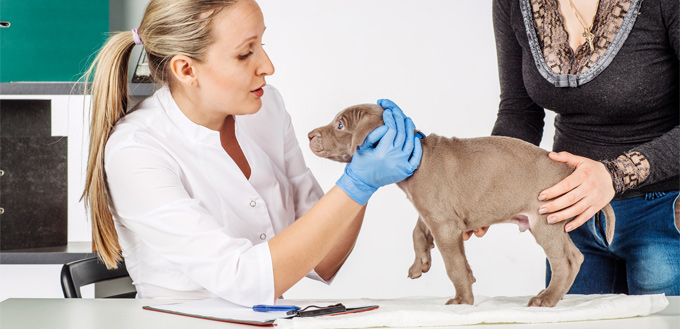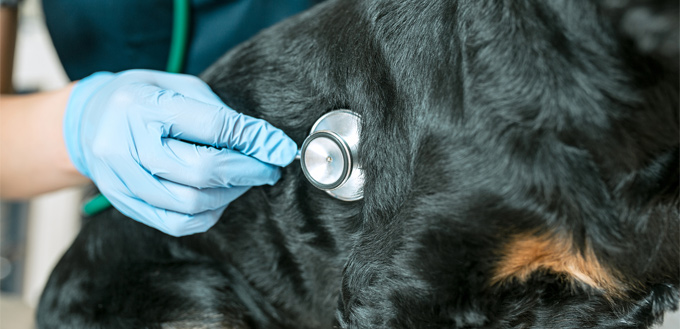Aside from being a fascinatingly fabulous talking point at dinner parties, being knowledgeable about your dog’s vomit can have some huge implications for your dog’s health. Knowing what it means if your dog starts throwing up can mean the difference between life and death for your precious pet. That’s why we’ve compiled a list of the what it means when your dog starts to vomit, signs and symptoms to look out for when you should be calling your vet and some basic information about how to treat your dog if he or she suddenly starts to vomit.
As always, if you are very concerned about your dog throwing up, or if there are sudden changes in your dog’s behaviour and mood, contact your local vet for some great, professional advice. While we always try to be as thorough as possible, we are not trained veterinarians and you should always speak to your vet before trying any new treatments.

The Difference Between Vomit And Regurgitation
When a dog is regurgitating food, this simply means that food (or items) that are currently still travelling toward the stomach will usually be forced back out of your dog’s system through their gag reflex. Meanwhile, a dog’s vomit will be ejected from the stomach and can contain partially digested food or even bile (a yellow, mucous-like substance).
If you’re not sure which one your dog is currently doing, you can usually tell by asking the following questions:
- How long ago did my dog eat?
If it wasn’t too long (roughly an hour and under), it is likely your dog is simply regurgitating their food. At this point, your dog will be unlikely to have started digesting their food, so you may see a mush of crunched up food along with some saliva, as opposed to partially digested food.
- Are they straining their stomach?
Vomiting will come from their stomach, so you may see their muscles contracting as their bodies force the liquid back through their digestive tract. Meanwhile, regurgitated products require more coughing and general discomfort- you may notice your dog do a couple of coughs and some empty heaving as they try to dislodge their food/eaten items.
- What does the vomit smell like?
While this isn’t the nicest question to answer, you can usually tell if the rejected food is vomit by the smell. Dog vomit will usually smell sour and unpleasant, while a regurgitated product is more likely to smell like whatever they just ate.
If your dog is throwing up undigested food, the most likely reason is regurgitation- not vomiting. Check below for some of our tips as to how best to treat your dog in this situation and try not to worry. These things happen, especially to us dog owners!
Different Types Of Dog Vomit
Before we get into the do’s and don’ts of what action to take when your dog throws up, it’s important to distinguish the difference between each type. This can help you define the difference between what requires more decisive action and what indicates that your dog needs a little cuddle and/or some space.
You know your dog better than anyone else, so if you’re really worried about your dog’s vomiting and have noticed a change in their behavior, do call your local vets for more specific advise. This is especially true here, where different types of vomitus from your dog can indicate a range of issues, as you may notice when you read on.
Dog Throwing Up Yellow Vomit
Yellow dog vomit occurs when your dog throws up bile. Bile is a relatively thick, mucous substance that comes from the liver and aids in digestion. You can sometimes see this alongside some partially-digested food in your dog’s vomit, which indicates that your dog has eaten too fast. The really confusing part here is that, because yellow vomit can mean a multitude of things, it can also be an indication that your dog isn’t eating regularly enough.

Other Reasons Your Dog Is Vomiting Yellow Bile
- It can be very likely that your dog has eaten some grass
There’s a number of theories surrounding why dogs eat grass and throw up. It has been noted that wild animals will often eat grass after hunting and some specialists theorize that this is because wolves and the like are missing out on some key nutritional requirements that the grass may provide. It is generally accepted, however, that dogs will eat grass when their stomach hurts, possibly to make themselves sick and ease the pain.
That said, if you think the grass your dog has eaten may contain pesticides, please call your vet immediately, as your pet may have been poisoned by the chemicals some landowners spray on their grass.
- Your pet’s diet currently contains too much fatty food
This is particularly important to watch out for since large amounts of fatty food over an extended period of time can lead to pancreatitis. This is the inflammation of the pancreas and can be quite painful for your pooch. If you know you have been feeding your dog higher amounts of fat-filled food than is normal, take your dog to the vets for treatment, before they become dehydrated and very poorly.
It is also very likely that your vet can prescribe the best dog vomiting treatment to help them, until their diet is back to normal, to help your dog stop throwing up. Either way, do be sure to have your pet checked out by a professional, to ensure no lasting damage occurs to your dog’s digestive system.
- Your dog may have an intestinal blockage
Vomiting yellow bile may happen after your dog’s stomach has been emptied, but it’s still not too late to call your vet if you think this might be why your dog has started vomiting. Some other signs related to this include extreme lethargy and your dog whimpering, as an intestinal blockage can be extremely painful for your pet.
- Allergies
If your dog has started a new food brand or type and has begun to throw up, it could be due to an allergic reaction to a protein in their new diet. The best way to double-check this is to phase out this food with their old brand or to see if there are any obvious differences in the ingredients. Similarly, you can work with your vet to decipher the offending nutrient that causes your dog so much hassle, until you discover the right recipe for your dog’s health.
Related Post: Best Dog Food for Allergies

Dog Throwing Up Clear Liquid/Water
Dogs will usually begin their vomiting with what appears to be excessive drooling. That is water pooling and pouring from the mouth. It’s quite common for a stressed and/or overheated dog to vomit clear liquid. Yet the likelihood is, if your dog is throwing up clear liquid, that this is a more watered-down version of throwing up bile.
If you have contacted your vet and they aren’t especially worried, please do read the above and hopefully put your mind at ease.
Dog Throwing Up Foamy Liquid
It’s very likely that, if your dog is throwing up foam, there is absolutely nothing to worry about. While your mind may immediately be jumping to words like “rabies”, it is actually much more likely for your dog to be vomiting white foam if they have indigestion. Quite simply, your dog’s stomach is working overtime because they ate too fast! Some other likely causes of your puppy vomiting include:
- Motion sickness
If your dog vomits foam during a ride in the car it can simply be the fact that they are suffering from motion sickness. It may be helpful to use a weighted dog coat in this scenario, and/or to pop your dog in a more “firm” environment during travel, such as the boot of the car instead of the back seat. Using a dog crate can also be helpful in this case.
Related Post: Best Dog Crates
- Too much exercise after eating
In a similar sense to indigestion, exercising after eating can lead to your dog being very uncomfortable, their stomach muscles contracting and thus, your dog vomiting. If you think this is the cause of your dog’s upset stomach, then restrict their food around their walks or try to keep your dog from becoming over-excited during walkies.
- A kennel cough
This is a common illness that dogs tend to contract after staying at (you guessed it) a kennel. It is highly contagious between dogs and can be picked up from any contaminated area. It causes your dog’s airway to become swollen and sore, leading to a regular cough, a runny nose, a low fever, a lack of interest in play and exercise and, of course, the vomiting of white foam.
If you think your dog might have kennel cough, it’s important to contact any local owners that your dog may have been in contact with, as well as the kennel your pup was in, if they stayed in one recently. That said, causes can also come from being in an environment that was cold, dusty or where people have been smoking. Either way, the only way to get a kennel cough diagnosed is by contacting your local vet and having them check your dog over.
The good news is that kennel cough can usually be treated within a few days, so your dog shouldn’t be suffering for too long. Humans can’t catch this, so don’t worry about the family getting too close to your pet. In the meantime, make sure your dog is drinking plenty of fluid and try not to use collars when out on walks, since this can pull against their already-inflamed throat.
- Bloat
Bloat is a life-threatening illness that causes a dog’s stomach to expand due to trapped air. In serious cases, it can cause the stomach itself to twist and be extremely painful for your poor pooch. If you notice excessive drooling, pale gums, an inability to defecate and a bloated stomach alongside the white foam vomitus, contact your vet immediately. Delaying can cause your dog to go into shock and, eventually, death.
- Kidney disease
Your dog’s kidneys are vitally important to them (just like ours are to us!). A well-functioning kidney can flush out many harmful toxins from their body, stopping the harmful bacteria from stagnating and becoming dangerous to your dog. Of course, kidneys that are struggling are unable to do their job well and this can lead to a very poorly dog.
There are many reasons as to why a dog might develop kidney disease, from their age to their exercise routine. Rest assured that, in most cases, kidney disease can be treated if caught in time. If you notice your dog becoming lethargic, struggling with urinating or urinating blood, as well as vomiting, take your pup to the vet to be properly diagnosed and treated.
You May Also Like: Dog Food for Kidney Disease
- Rabies
While it is highly unlikely for domestic dogs to contract rabies, it can happen. Not to mention that vomiting white foam is usually one of the later signs of rabies, at which point your dog will likely have already been diagnosed and treated. In this case, there are plenty of preventative medications available to help your dog. If you keep your dog up-to-date with all of their jabs, rabies should not be a concern for you or your dog.
- Parvovirus
Common in puppies who haven’t received their immunisations, parvo is, unfortunately, an untreatable illness. If you vet diagnoses parvo in your pup, you will be given medications to give to your dog and they will be made as comfortable as possible. Other symptoms include lethargy, anorexia, bloody diarrhoea, and a fever, alongside regular vomiting of white foam.
Dog Throwing Up Brown Liquid
If your dog is throwing up brown liquid, it is important to take your pet to the vets as soon as possible. This is because brown vomit from your dog can indicate some serious issues that should only be diagnosed and treated by a trained professional. The majority of brown vomitus in dogs comes from a source of blood, although the source itself can vary, so having your pup checked out thoroughly is the best course of action. Some known reasons for brown dog vomit include:
- Ulcers in the stomach and digestive tract
Just like us humans, dogs can develop ulcers through stress, poor health and sometimes even medication (in particular, aspirin and NSAIDs). If the ulcer is present in near the stomach or intestine and begins to bleed, your dog will likely vomit up the part-digested blood, giving a brown or dark-to-black colour.
Your dog may also be suffering from ulcers or cuts in the mouth, which means that the vomit might be a lighter red at first. The best bet here is to check your dog’s gums to see if you can verify the issue, yourself.
- Internal blockage
There are all kinds of items that can create a blockage in your pup. If your dog is suffering from a blockage in their digestive system, you may notice that they are struggling to defecate, loss of appetite and abdominal pain. This is especially likely if you know they’ve recently eaten something that they shouldn’t have! Take your dog to the vets to get the issue resolved before surgery is needed and your dog should be fine in a few days’ time.
- Tumours
While not a pleasant thought, both cancerous and benign tumours can sometimes create internal bleeding, either through the pressure created or by tearing/bursting. This can be likely if you notice your dog is suddenly in pain, and they are vomiting frequently. If this is the case, then please do contact your vet immediately, so as to stop anything more sinister occurring.
- Something they ate
On a lighter note, if your dog is vomiting brown liquid, it can simply be something they ate! If you know your dog has had his or her nose in some dirt (or similar) it will most likely simply be the rejected substance coming back up.
Dog Throwing Up Grainy Or Granular Vomit
Similar to above, grainy vomit that has a granular texture indicates more serious problems in your pet. This is because there are no signs of food in the vomitus (indicating that everything has been digested, so there are no food-related causes) which means the issue is likely to have stemmed from a more serious issue. This can include many of the same reasons as above in “dog throwing up brown liquid”, so contact your vet immediately to be sure that they are seen and treated as soon as possible.
When To Call The Vet If The Dog Is Vomiting
It is always a good idea to call your vet if you are worried. Most vets won’t consider this annoying, in fact, they are much happier for you to come in and see that nothing is wrong, than have a nervous owner decide not to bother them and have the worst happen to their best friend.
You know your dog best and, if you spot anything that concerns you or that is out-of-character for your pup, it is important that you contact your vet to rule out anything sinister and to put your mind at ease.

Dog Vomiting Treatments
If you have been able to rule out any serious conditions, it’s always a good idea to try some gentle foods on their sore stomachs. These include chicken and rice, sweet potato and low-fat cottage cheese. If these don’t work, you can try fasting your dog for 24 hours to allow their stomach some time to heal.
This is where you withhold food from your pup until 24 hours have passed. It can feel a little mean, especially when they give you the puppy-dog eyes but it’s necessary! Once the time is up, try the above food types again and see how they fare. It can also be a good idea to check their food if this has recently been changed, to ensure that your dog isn’t vomiting as a reaction to an allergy.
Some dog owners also swear by the use of herbal teas, such as chamomile or peppermint, which can easily be added to your dog’s food, to help settle their stomach and help stop the vomiting. This isn’t a fully researched and sure-fire way to treat dog vomiting but it’s also not harmful, so it can be useful to try if you are so inclined.
Hopefully, this guide to different types of dog vomit will help you know what to look out for and what is a serious cause for concern, as well as what is not! Remember that your vet is always there to help you if you’re still feeling a little stuck or confused, so don’t be afraid to give them a call for some more information.
Do you have any go-to’s for when your dog isn’t feeling well? Get in touch and let us know what they are, we’re always happy to hear about the best ways to help your pups.
Check out our recent article: My Dog Ate Gum – What Should I Do?
Sources:
- Brenna Davis, Why Does My Dog Eat Grass & Vomit?, The Nest
- Susanne Felser, DVM, 5 Reasons Why Your Dog Is Throwing Up Bile, PetMD
- Michele K, Vomiting Brown Liquid in Dogs, Wag Walking
- Dr.Pippa Elliott, How to Diagnose Vomiting in Dogs, WikiHow
Note: The advice provided in this post is intended for informational purposes and does not constitute medical advice regarding pets. For an accurate diagnosis of your pet's condition, please make an appointment with your vet.







